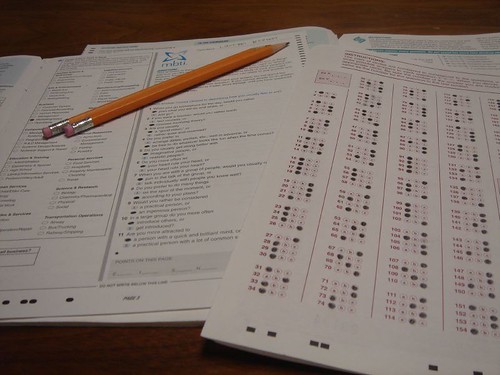 |
|
|
This one caught my eye because I’ve done a good deal of work in Alberta lately — but also because of part of the title, Who can Unlearnall the Facts That I’ve Learned?. It’s an article from VUE Weekly, an independent newspaper from Edmonton. From my experience, standardized testing does seem to be a central part of education in the Province. But I’ve also talked with educators there, who have a keen interest in what’s going on with education in Finland.
The article mostly refers to statements by Dr. Pasi Sahlberg, an education specialist at the European Training Foundation (ETF). There’s nothing really new here for those who have questioned my country’s growing and continued reliance on standardized testing as an avenue to education reform. But I found interesting, his explanation of the growth of the movement and the response by Finland.
From the article, Sahlberg says,
Sahlberg says that the reliance of standardized testing to judge the success of student performance started in England in the 1980s and quickly spread to North America, Australia and other developed nations. Sahlberg’s home country of Finland, on the other hand, was not swept up in trying out the new approach.
“Scandinavian countries were not convinced that through competition education would be improved. Instead an idea of equality is pervasive—that every child needs to be provided with equal opportunity through good education,” he explains.
This perspective means schools in his country look different than those in countries that embraced standardized testing.
“For example, schools in England have only two or three core subjects in the curriculum, whereas in Finnish schools there is more of a broad focus that includes the social arts, based on the belief that the success of individuals is not solely achieved through the instruction of only math and sciences. The whole education system in Finland, from kindergarten to Grade 12, has no high-stakes external testing system,” he explains. (( Couture. Xanthe. “Standardized Testing: Who can Unlearn all the Facts that I’ve Learned?,” VUE Weekly 5 Marth 2009. Web.16 Aug 2009. <http://www.vueweekly.com/article.php?id=11228>. ))
Offering a U.S. perspective, Dr. David Berliner, of Arizona State University, defends standardized testing under certain specific situations. “I would not want a pilot flying a plane unless he has passed all his pilot exams.” He then continues,
..when high-stakes testing is applied to kids and can mean that they will not graduate and that teachers can get fired, this is a different situation all together.
There are problems with relying heavily on test data.
When you value an indicator too much you can predict that there will be corruption in the numbers because the people who administer the evaluation will corrupt the figures. This scenario has been found to occur in high-stakes testing in US public schools. There are documented cases of teachers keeping some students at home on test days, along with other measures, to get the best results possible.
I would suggest that over-emphasizing tested subjects or tested standards within a subject, at the expense of softer and less measurable elements of learning is another way that the data and our education system are being corrupted.
Reading through this, I was compelled to find some data on international comparisons of student achievement, finding this American Institutes for Research study (Chance Favors the Prepared Mind: Mathematics and Science Indicators for Comparing States and Nations [pdf]), reported in a November 15, 2007 Times Story (Study compares American students with other countries’). NY Times said,
The study equated standardized test scores of eighth-grade students in each of the 50 states with those of their peers in 45 countries. Experts said it was the first such effort to link standardized test scores, state by state, with scores from other nations. (( Dillon. Sam. “Study Compares American Students with other Countries’,” The New York Times 15 Nov 2007. Web.16 Aug 2009. <http://xrl.in/2xdi>. ))
Here is the graph that shows my own state, North Carolina, with other nations, putting us fairly near the top in Math, bested by Singapore, Hong Kong, south Korea, Taipei, Japan, Belgium, Netherlands, Hungary, and Estonia. We fair less well in Science, closer to the middle of the list.
 |
|
|
So, I’m left with two questions.
| Is this why we do what we do? |  |
 |
Or is this why we do what we do? |  |
 |
| Supposed to convey happy successful people Flickr Photo by Mariëlle |
|||||
and…
 |
Does a reliance on this.. |
Necessarily lead to This? |
 |
 |
 |
||
| Supposed to convey happy successful people Flickr Photo by Mariëlle |
|||
What do you think?

Powered by ScribeFire.

High stakes testing is not how we get educated young people. Check out my blog post that is a response to David’s question. http://innovateeducationllc.blogspot.com/
Mike M.
I think that the system in Finland sounds wonderful. At the same time, would it work in competitive societies such as in Britain, the USA, Australia, and Canada? The problem here is that we expect to know what our children are good at while they are still fairly young and then our children are expected to stick with these talents so that they can compete against others their age for reputation and jobs later on. Keeping a balance in what students are educated in means that they get less time to focus on such talents which in turn makes parents unhappy. It would be very difficult to change this mentality.
Unfortunately, standardized tests take on the same competitiveness. Without standardized tests, many education systems will be at a loss towards how to separate the “talented” from the “untalented”. If these tests were to be taken away someone would have to have a plan for an alternative and be willing to teach everyone on how to implement it.
Educating the creativity out of students isn’t what education should be about. And these standardized tests do just that. They force students to focus on test taking skills under given conditions which theoretically calculates an accurate representation of a student’s knowledge. Of course, our society needs a standard to work in education seamlessly into our civilized and structured life but really, we need to revolutionize our thinking. I’ve always been against standardized testing because it’s awfully inaccurate. There are a lot of test taking skills that come into play when doing these standardized tests and some people just don’t know how to display their learning. Honestly, energy should be focused on improving students’ learning experience rather than overspending it on finding methods to ‘see’ a student’s knowledge.
I am concerned.
As a parent, I would surely be aghast if the only measure of a child was their achievement on a provincial achievement exam.
However, if my supposedly well-educated child was not capable of passing an achievement exam, even though the majority of her peers were, I would not be a happy Dad, either.
Your article seems to intimate that smart kids are incapable of scoring well on these tests, or that their ability to do so is not a valid measure. To be a bit more realistic, I would suggest that a range of assessments, INCLUDING achievement tests, should give one a fairly well-correlated look at a child’s abilities.
The testing in Alberta is neither ‘high-stakes’ nor ‘over-emphasized’. Nobody fails as a result of not passing an achievement test, nobody gets fired, the mark doesn’t even have to be used in the student’s grade. To the contrary, the test in Alberta are directly written to the curriculum, are built by teachers, and are designed to help the system improve.
I would suggest that teachers who continually are unable to get their students to pass these benchmark exams should probably be asking their peers for some help, and taking a hard look at what they perhaps aren’t doing.
Yes, ‘Teaching to the test’ could be a bad thing – if the test wasn’t representative of the student outcomes. However, when it is, NOT teaching to the test might be considered malpractice. No evidence would seem to suggest that poor teaching of topics outside the curriculum is more beneficial to students.
Concerned Parent,
I do not believe that we disagree in any substantial way. I really have no objection, what so ever, to achievement tests, or tests in general. You have to test a thing to measure its value. My main objection is what is often referred to as “High Stakes” tests, where a student’s passing or failing or a schools labeling, depends on how students perform. This is wrong in so many ways, and I suspect that you would agree.
I can find no fault in the testing program in Alberta — as you describe it.
Again, I find myself only impressed with the educators I have worked with in Alberta, as well as the provincial leadership.
Thanks for continuing the conversation.